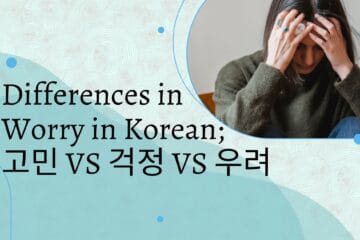Past swear words some of the most fun things to learn is slang. You can easily connect with and impress Koreans with your knowledge past typical dictionary or textbook-level Korean.
So let’s get into some Korean slang. I’ll try to break it down by its meaning/origin and whatever else might be interesting about the word/phrase and see if there is an English equivalent!

Positive and Negative Slang
대박: awesome
대박 or originally meant “a big success/hit” but has expanded past to be more of a general exclamation or outburst. Typically still used in a positive context, but you may hear it used negatively as well. You will hear it used as a noun and verb with 대박이다.
English equivalent: awesome
꿀잼: fun/interesting
Combination of 꿀 (honey) and 재미있어요 (fun). Said to express something that is really fun or interesting.
English equivalent: lit
노잼: not fun/uninteresting
You can probably figure this one out; take 꿀잼, simply add “No” to it, and you get 노잼. Used for when someone says something weird or unfunny.
English equivalent: weak
킹받다: super annoying
킹 (king) is combined with 열받다 (annoying) to emphasize something or someone who is especially annoying.
헐: wow/oh my gosh
헐 is used as an exclamation when you hear something unbelievable. It originally started with being used for you feel dumbfounded but it can be used for both positive and negative situations/reactions.
English equivalent: oof/sheesh
Slang Affixs
짱: the best
짱 is a classic Korean slang word that means the best. It has evolved to be used as an adjective and affix now and put at the end of certain words to emphasize the best of x. 얼굴 (face) + 짱: 얼짱: best face. 몸 (body) + 짱: 몸짱: best body.
개: really/very ___
I’m bulking all these together since they are all pretty normal words with just 개 added to the beginning. 개 is put there to intensify something, like “very/really” but more vulgar.
개추워: very cold
개피곤해: very tired
개 멋있어: really cool
개웃기네: really funny
미친 개쩐다: very awesome
English equivalent: __ asf (eg: tired asf, cool asf, etc.)

Food Related Slang
맛점: delicious lunch
Shortened version of the phrase “맛있는 점심” which is directly delicious lunch.
맛저: delicious dinner
Likewise, this one is from “맛있는 저녁식사”, with 저녁식사 meaning dinner.
존맛탱/JMT: yummy
존 comes from 존나 which is a lesser swear to 좆나 (fucking) similar to “freaking”. Then add in 맛 which means taste, and 탱 which is a cutesy suffix, like adding “y” or “ie” in English (eg: duck to ducky, fish to fishies, mom to mommy).
English equivalent: bussin’ (but make it cute haha)
치맥: chicken and beer
치킨 (chicken) + 맥주 (beer) is one of Koreans’ favorite drinking pairings!
Romantic/Dating Korean Slang
모쏠: single since birth
모태솔로 is shortened down to 모쏠. 모태 meaning womb, and 솔로 meaning solo. So simply just someone who has never dated or been in a relationship.
English equivalent: forever alone (모쏠 is used more casually or jokingly, so I wouldn’t say it has a similar feeling to incel)
농협은행: you’re so pretty!
This Korean slang comes from an online clip where a foreigner had trouble with pronunciation. He was asking about “농협은행” (Korean Bank) and was misunderstood, the women thought he was saying “너무 예쁘네요” (you’re so pretty)! So now it’s a joke to just comment the bank, while complementing someone.
남사친: guy friend
This word comes directly from the combination of 남자 (man) 사람 (person) 친구 (friend). To mean a boy who is just a friend, not a boyfriend. Likewise, there is:
여사친: female friend
여자 (girl) 사람 (person) 친구 (friend)
품절남/품절녀: recently married man/woman
품절 is a Korean expression for sold out. Add on 남 for man or 녀 for woman and you have a man or woman that is sold out, and off the market!
English equivalent: off the market
For more dating slang check out my Korean Dating and Romance Terms post here.

Gaming Terms as Slang
만렙: Level 10,000
만렙 is a combination of 만 (10, 000) and 레벨 (level). This refers to someone who is an expert, or especially great at something.
English equivalent: goat/goated
쪼렙: beginner level
Likewise, 쪼렙 pulls from 쪼그만한 (small) 레벨 (level). For someone who just starting out and a beginner.
English equivalent: newb/noob
래전드: legend
This one is simple! Simply it is the same as English use for ‘legend’, saying someone or something is legendary or impressive. Such as praising someone’s skill like “Wow IU is a legend! Such an amazing singer!”
English equivalent: legend
In Conservation
인정/ㅇㅈ: agreed
Translated directly to an acknowledgment, you use it in a situation to agree with something someone said. Something like “날씨 너무 추워요” (it’s so cold) “인정!” (agreed!)
English equivalent: bet
솔까말: speak honestly
This slang pulls from the first character of words in the phrase “솔직히 까놓고 말하다” (honestly and directly speak). So you can use this when you want to speak honestly and bluntly/straight. Telling someone to directly tell you something or that you will speak honestly.
English equivalent: tbh
구라치지마: stop lying
It has the same meaning as “뻥치지마” (don’t lie) but this phrase is more popular with Gen Z. Simply telling someone to stop lying or stop bullshitting.
English equivalent: stop the cap
새삥: new
쌤삥 means something new and in great condition, or a second-hand item that is like new.
I’ll leave you off with these, but this is just getting started into slang! Just like with English, there are new words/phrases that pop up all the time, and likewise, others that fade out.



2 Comments
dover · February 26, 2025 at 1:50 am
Awsome info and straight to the point. I am not sure if this is in fact the best place to ask but do you folks have any ideea where to hire some professional writers? Thx 🙂
Pam · February 27, 2025 at 12:42 am
Thank you, happy you find it useful! For finding professional writers I’m not sure as I write all the posts on Koreanling myself, good luck though!